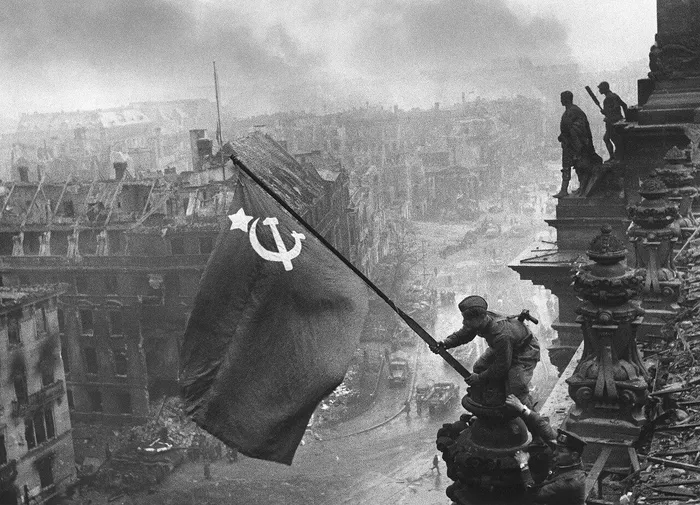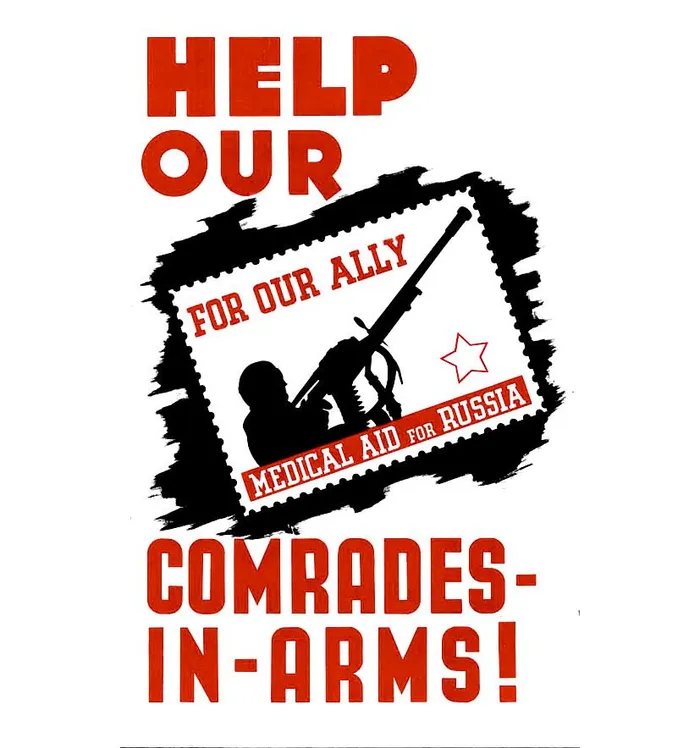Our duty to remember — Ahead of the 80th anniversary of the victory over Nazism

Soviet soldiers raising a flag over the Reichstag, May 1945
Image: Yevgeny Khaldei
Russia, together with its allies and like-minded partners, will continue to counter any attempts to distort the historical truth and memory of World War II.
On 9 May 1945, at 00:43 Moscow time, the German Instrument of Surrender was signed in Berlin which ended the Great Patriotic War. It started on June 22, 1941 with an attack of the Union of Soviet Socialist Republics (USSR) by Nazi Germany and its satellites, and concluded with a complete defeat of the invaders. The Great Patriotic War of the Soviet people against Nazi Germany is the crucial part of World War II (1939-1945), the largest military conflict in history.
This war changed the tide of world history, people’s fates and the global political map. The victory was paid at the heaviest price – with lives of millions. The Soviet Union alone lost about 27 million men, which constitute 40% of all human losses in World War II. There was not a single family unaffected by the war across the entire USSR. Everyone performed its own feat – on the frontline and in the rear – to hasten the Great Victory Day.
We remember and value the contribution of the Allied nations to the victory. Russia is grateful to South African public organisations, such as the Friends of the Soviet Union and the Medical Aid for Russia which raised around £1 million in donations between 1942 and 1945 and arranged well-publicised charity events to show solidarity with the Soviet people.
We will never forget the efforts of South Africans who, in the face of mortal danger, under Nazi shelling, aboard the Arctic Convoys delivered strategic cargoes from the countries of the Anti-Hitler Coalition to the USSR. In March 2025, Russian diplomats passed the anniversary medal ’80 years of the victory in the Great Patriotic War of 1941-1945’ to Joseph Wilkinson, 99-year-old naval veteran residing in Cape Town.
Several years ago, another World War II veteran passed away in South Africa –Tsipra Maiburd from the USSR. In 1941, when Nazi Germany attacked the Soviet Union, she was a student of a medical institute and volunteered to treat the wounded soldiers at a military hospital in Moscow. The Embassy of Russia cherishes the memory of her life and her feat.
In fact, the majority of the wartime eyewitnesses have already departed this life – veterans and their family members, victims of Nazi concentration camps, ‘children of war’ etc. Largely due to that, the perception of the war by today’s younger generations changes. People’s fear of those tragic events repeating goes away, while the memory of World War II increasingly becomes the subject of myth-making and outright falsification.

Agitation poster of the South African organisation ‘Medical Aid for Russia’, between 1941 and 1945
Image: Supplied
Regrettably, in a number of countries this trend has been politically instrumentalised. “Future generations will acknowledge their debt to the Red Army as unreservedly as do we who have lived to witness these proud achievements” – UK’s Winston Churchill wrote in February 1945 in a personal message to Joseph Stalin. Yet today the reality has changed drastically from that described by the then British Prime Minister.
Western politicians seek to diminish and distort the role of the Red Army in the liberation of Europe from Nazism, equate the USSR with Nazi Germany, and portray the Soviet Union almost as one of the main culprits of the war. All these cannot but stir indignation among the peoples who bore the brunt of the struggle against misanthropic regimes.
Historical revisionism is extremely important for the West, attempting in every possible way to whitewash the dark spots in its own past. After all, practically all of Europe was complicit in the crimes of the Third Reich. In total, the Wehrmacht and SS units included over two million citizens of European states, mostly volunteers (from Denmark, Finland, Italy, Norway, Romania, Spain, etc).
Read more about it in the Russian Foreign Ministry’s report ‘Eighty Years After the Great Victory: Europe has Once Again Fallen in the Shadow of Nazism’
Neo-Nazism raising its head across Europe at present is a direct result of that policy, as are the monstrous regime in Kiev the EU has nurtured and aggressive Russophobia that grew manifold after the start of Russia’s special military operation to protect Donbass and safeguard its civilians from genocide.
Russia, as the country that suffered most from the horrors of World War II and the Third Reich’s inhumane policies, is dismayed with the rehabilitation of Nazism and glorification of Nazi criminals in certain countries. Together with our allies and like-minded partners, we will continue the work to counter any attempts to distort the historical truth and memory of the Great Patriotic War.
A priority for Russia will remain the perpetuation of the memory of the genocide of the Soviet people during the Great Patriotic War. In 2022‑2025, Russian courts recognised the crimes committed by the Nazis and their collaborators against the peaceful Soviet population and Soviet prisoners of war as genocide in territories currently belonging to 33 regions of the Russian Federation.
We will never allow the lessons of the past to be forgotten. We must remember – for the sake of our common future.
Written by Roman Ambarov, Ambassador of Russia to South Africa
** The views expressed do not necessarily reflect the views of The Star, IOL or Independent Media.